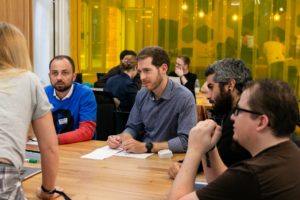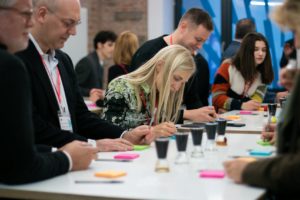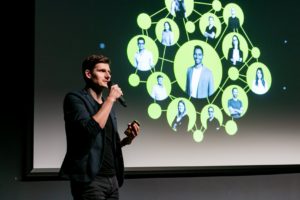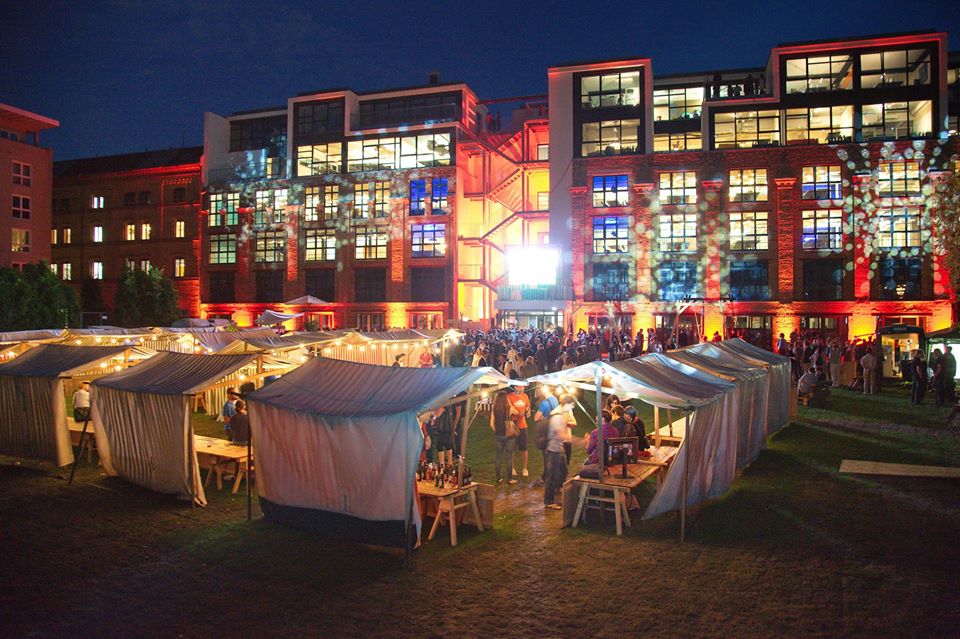Factory Berlin’s aim is to become one of the world’s biggest hub for innovators. And the goal is partly achieved. In 2018, more than 50% of all the startups created in Berlin were launched from Factory Berlin. Nowadays, Factory Berlin covers a community of 3.000 individual members, 80+ bigger startups, and 40 corporates. Martin Eyerer is the Chief Innovation Officer at Factory Berlin. He supervizes a highly curated community of entrepreneurs coming from 70 nations, from which 40% are women, and who are active in cutting-edge fields such as Artificial Intelligence, Blockchain, VR, UX/UI, mobility or IOT. Lately, Factory Berlin started to onboard renowned artists and musicians to their community as well. “We connect and bring people together to build new businesses, to help each other, to collaborate, and to be inspired“, underlines Martin Eyerer.
Hi Martin. Is Factory Berlin’s concept different from any other traditional startup accelerator/incubators?
 To us, it is. Our “unique selling proposition” (USP) is not to provide the best space and desk to work from, it’s to provide and curate a community of values. Curation is really the key word. We carefully select who we believe fits into our community at first. That being said, the curation process doesn’t end after a successful onboarding. We constantly think about how to bring the right people together to fulfill their needs. We host more than 650 events per year. Half of these only aim at connecting members, to share knowledge and experiences, or to network. Our Slack channels are curated the same way. More than 80% of our members are active on Slack on a daily basis, exchanging 25k + messages per week. We learned a lot throughout the last years about what works and what doesn’t work. Meanwhile members apply mainly for being part of the networks rather than looking simply for a space to work. Traditional incubators and accelerators usually demand shares of the business founded in their hubs. At Factory Berlin, we only ask for a membership fee. This makes us more trustworthy. It’s one of the key factors why the best people come to work within our community, we think.
To us, it is. Our “unique selling proposition” (USP) is not to provide the best space and desk to work from, it’s to provide and curate a community of values. Curation is really the key word. We carefully select who we believe fits into our community at first. That being said, the curation process doesn’t end after a successful onboarding. We constantly think about how to bring the right people together to fulfill their needs. We host more than 650 events per year. Half of these only aim at connecting members, to share knowledge and experiences, or to network. Our Slack channels are curated the same way. More than 80% of our members are active on Slack on a daily basis, exchanging 25k + messages per week. We learned a lot throughout the last years about what works and what doesn’t work. Meanwhile members apply mainly for being part of the networks rather than looking simply for a space to work. Traditional incubators and accelerators usually demand shares of the business founded in their hubs. At Factory Berlin, we only ask for a membership fee. This makes us more trustworthy. It’s one of the key factors why the best people come to work within our community, we think.
What are the criterias to become a member?
We look carefully to each application, trying to find out if the applicant fits into our value system – if she or he fits by personality. We look for open-minded creators and risk takers who want to rethink the world of tomorrow. The domain they are working in plays a role, too, but this is not the main condition. And as I already mentioned before, we also look for artists and musicians who fit into our community
After 6 years of operations, what are the biggest changes you have observed within the Berlin and European ecosystems?
 When we opened Factory Berlin, we were among the first movers.Opening a house dedicated for startups was not something common. Since then, Berlin became one of Europe’s Hot Spots for the Tech Scene. Maybe the most and fastest growing one. Berlin has been attractive to creative people around the globe to come here and get inspired or to stay and work from here. Over the last six years, this development strengthened. Nowadays, Berlin is definitely one of the hype cities worldwide. With the rise of the gig economy, the demand of individuals for space grew more and more. We understood that we had to do more than simply provide with spaces. There was an opportunity to build networks and bring people together to exchange experience and know-how, and to collaborate. These days a lot of other players in the coworking field talk about community – it became a trend not only here in the Berlin ecosystem but all over the globe as well. However, only few players know how to curate a community properly. This might sound arrogant, but the fact that we are by far the number one in Berlin for founded businesses coming out of Factory Berlin speaks for itself.
When we opened Factory Berlin, we were among the first movers.Opening a house dedicated for startups was not something common. Since then, Berlin became one of Europe’s Hot Spots for the Tech Scene. Maybe the most and fastest growing one. Berlin has been attractive to creative people around the globe to come here and get inspired or to stay and work from here. Over the last six years, this development strengthened. Nowadays, Berlin is definitely one of the hype cities worldwide. With the rise of the gig economy, the demand of individuals for space grew more and more. We understood that we had to do more than simply provide with spaces. There was an opportunity to build networks and bring people together to exchange experience and know-how, and to collaborate. These days a lot of other players in the coworking field talk about community – it became a trend not only here in the Berlin ecosystem but all over the globe as well. However, only few players know how to curate a community properly. This might sound arrogant, but the fact that we are by far the number one in Berlin for founded businesses coming out of Factory Berlin speaks for itself.
A lot of other players in the coworking field talk about community – it became a trend not only here in the Berlin ecosystem but all over the globe as well. However, only few players know how to curate a community properly.
How do you position yourself as opposed to the many new coworking players who popped up in Berlin the last years?
 We were the first ones to curate and select who would make our community better. Until today there is no one else on the market in Berlin with the same business model. As we always want to stay on top of the game, we launched this year our new strategy called the Creative Code. Creative Code is about bringing artists and musicians into our community to foster a change of perspective, to inspire each other and learn from each other, and to collaborate on a cross-industry level. It’s about fostering innovation and living a culture change we believe is happening at the moment. We also announced a joint venture with the Riverside Studios Berlin – a globally renowned community of 45 artists and songwriters – and connected their community to the Factory Berlin community. And we opened a space we call the Creators Lab, where we actively live the creative code, making this strategy more tangible. A few collaborations with Sonar+D from Barcelona or Ars Electronica Austria already made us position Factory Berlin in a wider field than before. The Creative Code launch was a big success: With more than 1,000 sold tickets for the launch event we were sold out and had great feedback from press as well as from the whole scene.
We were the first ones to curate and select who would make our community better. Until today there is no one else on the market in Berlin with the same business model. As we always want to stay on top of the game, we launched this year our new strategy called the Creative Code. Creative Code is about bringing artists and musicians into our community to foster a change of perspective, to inspire each other and learn from each other, and to collaborate on a cross-industry level. It’s about fostering innovation and living a culture change we believe is happening at the moment. We also announced a joint venture with the Riverside Studios Berlin – a globally renowned community of 45 artists and songwriters – and connected their community to the Factory Berlin community. And we opened a space we call the Creators Lab, where we actively live the creative code, making this strategy more tangible. A few collaborations with Sonar+D from Barcelona or Ars Electronica Austria already made us position Factory Berlin in a wider field than before. The Creative Code launch was a big success: With more than 1,000 sold tickets for the launch event we were sold out and had great feedback from press as well as from the whole scene.
A few collaborations with Sonar+D from Barcelona or Ars Electronica Austria already made us position Factory Berlin in a wider field than before.
Do you focus on some niches, such as IoT or Blockchain technologies, for instance?
We cover most of the tech fields driving the global tech scene nowadays. This is not limited to IoT or blockchain technologies. We can add Artificial Intelligence, Web Programming, Digital User Experience or Virtual Reality. We think we have the best people from all of these domains within our community. This is a core reason why our corporate partners and startups consider our pool of highly talented people a valuable resource to help them grow their businesses.
Indeed you host innovation departments from corporations such as the Deutsche Bank, Schaeffer, etc. How do they connect with the rest of the ecosystem?
 We organize 400+ events per year for the whole community. These events bring experts and entrepreneurs together in different formats (Masterclasses, Pitch Events, Fireside Chats, etc.) and provide valuable education also for corporates. We also support Community Circles – self-organized sub-communities that are gathered around shared interests, industries, and projects (IoT, Blockchain, Design, Mobility and more). These Circles have proved beneficial for corporates as a type of sandboxes, where ideas can be tested securely. Last but not least, our corporate – or industry – partners are also perfectly accessible to our individual members, adding further value to our community.
We organize 400+ events per year for the whole community. These events bring experts and entrepreneurs together in different formats (Masterclasses, Pitch Events, Fireside Chats, etc.) and provide valuable education also for corporates. We also support Community Circles – self-organized sub-communities that are gathered around shared interests, industries, and projects (IoT, Blockchain, Design, Mobility and more). These Circles have proved beneficial for corporates as a type of sandboxes, where ideas can be tested securely. Last but not least, our corporate – or industry – partners are also perfectly accessible to our individual members, adding further value to our community.
Have you planned to grow in other German or European cities?
Definitely. There are no concrete details yet, but we are talking to other German cities. In 2017, we opened our second Berlin location at Görlitzer Park and learned a lot from it. The next natural step is to expand to other German cities. We can then take the lessons learned with us for internationalization. We’re also building as a priority our digital product, which we will launch in spring 2020. This is an essential part of our growth strategy. The platform is not only a tool to support communities within physical space, it’s also a vision-driving product to support community-building and curation in a digital world.
The next logical step is to expand into other German cities. We can then take the lessons learned with us for internationalization.
Join Coworking Europe Conference for more insights, data and connections!


